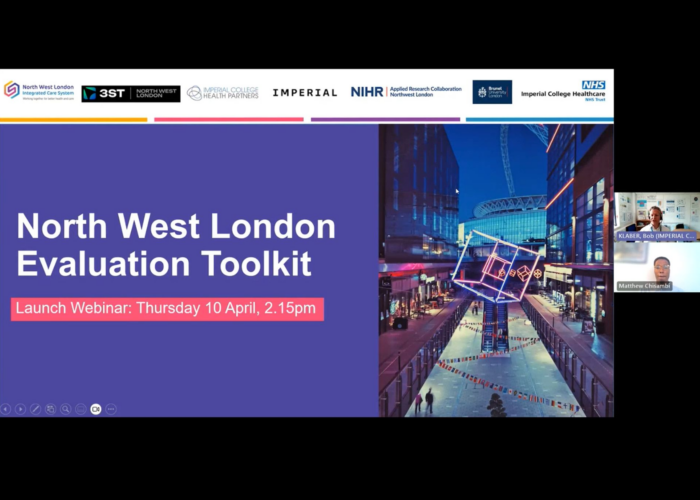
No one wants themselves or a loved one to be in hospital when they don’t need to be, but nearly all of us are familiar with that scenario. The process of discharging patients and continuing care at home can be complex, both for families and for staff, and particularly for elderly patients.
Remaining in hospital for longer than medically necessary is a lose-lose for all parties. For patients, prolonged stays in hospital can lead to an increased risk of falling, catching infections and, in some cases, mental and physical deconditioning. For staff, managing unnecessary hospital stays can reduce the amount of time and care they can offer other patients, leaving them exhausted and frustrated. For the system, this limits the ability to admit new patients and provide timely, life-saving care.
That’s why North West London has come together to focus on this challenge that spans health and care – across professions and organisations, across patients and families – as one of the area’s Missions for Research and Innovation: Enabling More Days at Home. The ambition for NW London is that:
By 2026, our health and care system will enable 50,000 residents to spend 180,000 more days at home, where clinically appropriate, with the right support for them and their families. Residents will only spend days in a hospital, community, or mental health care bed when it is the best place to meet their health and care needs. Staff in all settings will feel they have the right resources to provide the best possible care.
Achieving these ambitious targets requires collaboration at every level of the healthcare system. As the innovation partner and Health Innovation Network for NW London, Imperial College Health Partners (ICHP) are coordinating the work in this area, working collaboratively with clinicians, patients, leaders, charities and innovators to test and implement innovations that specifically and meaningfully address these challenges and support people, where medically appropriate, to recover at home.
But what do we actually mean in NW London when we talk about more days at home? And why is it vital that we come together as a system to prioritise this?
Home: What does it mean for patients and families?
Within this challenging landscape, we need to ensure that care works for everyone and that patients’ needs are met in a safe, appropriate and person-centred way. We know the dangers of unnecessary long stays in hospital, but what are the benefits of recovering or receiving care at home? Familiarity, autonomy and dignity. Evidence shows it is better for a patient’s physical and mental wellbeing to leave hospital as soon as they are medically fit to do so. By receiving care at home patients can stay independent, recover in familiar surroundings, and feel comforted by time with loved ones.
Home: What does it mean for staff?
After a stay in hospital, most people are eager to get home as soon as possible, and staff are keen to discharge all patients who are medically fit to leave. But the process for care coordination and discharging a patient is incredibly complex – it requires multiple members of staff across different disciplines and expertise to be involved, sometimes across different sites or organisations. Staff are put under enormous pressure managing these unnecessary stays, working to different time frames and deadlines across teams, and are taken away from providing care for those who need it most. It isn’t sustainable and leaves our colleagues exhausted and frustrated.
Any solutions and innovations implemented in this area must reduce the burden on frontline clinical and operational staff and streamline the process for discharging patients who are fit to leave. We only want to implement solutions that are meaningful for staff and contribute to their existing goals and targets.
Home: What does it mean for the system?
Longer hospital stays for patients who could be treated in other settings, including at home, puts pressure on already stretched bed occupancy – resulting in limited ability to admit other patients. By ensuring that care is delivered in the most appropriate setting, the NHS also reinforces the principle that health outcomes should be at the heart of decision-making: if home is the best place for a patient to recover, that’s where they should be.
Why innovation? Why not prioritise more beds?
Innovation is vital in tackling this problem. Adopting and scaling the right solutions can improve outcomes and experiences for patients, service users and staff, all while reducing pressure on the system. And following a collaborative discovery phase, NW London are focusing on innovations that support discharge optimisation and predicting length of stay, where we believe we can have the most impact for patients, staff and the system.
We’ve started testing exciting innovations already, with several Implementation Sites (real world settings that bring together a multi-disciplinary, multi-organisational team in a real-world setting) already live. Working in this way, aligning the focus of multiple organisations on one shared goal, means we can go further faster.
How do we know this approach is working?
There is already lots of great work happening in this area across the country, but to ensure we are spreading and scaling the innovations that have the most impact for patients, staff and the system, we’re embedding robust and rigorous evaluation at the heart of our approach. And thanks to that, we’re confident of the impact of the innovations we’re testing and the impact of the Mission – particularly through the implementation of the Optimised Patient Tracking and Intelligent Choices Application (OPTICA). Implementation of OPTICA has meant, for the first time, NHS and adult social care colleagues working across Hillingdon Hospitals NHS Foundation Trust and Hillingdon Council (one of the Mission implementation sites), can now access a single source of real-time information about each patient’s discharge arrangements. This is enabling the system to enhance collaborative working, reduce administrative tasks, and improve communication around the discharge process – a hugely positive result.
Innovation is a team sport
Innovation is at the heart of solving the complex challenges surrounding delayed hospital discharges and meeting the demands of a growing and aging population. But innovation is not a solo act – it can only thrive when delivered collaboratively. In 2025 we’ll continue to work with professionals across NW London, industry and innovators, as well as charities, patients and service users to continue to test innovations that enable more days at home for our population – all with the ambition of scaling and spreading solutions that we know work.
With the right innovations, underpinned by patient perspective and staff knowledge, expertise and passion to improve services, we can make a real difference in NW London.
You can find out more about the Mission to enable more days at home here.
Want to work with us to make an impact in NW London? Get in touch to find out how we can best work together.
If you have any questions about the Mission, or our existing implementation sites, reach out to our team for an informal chat.



